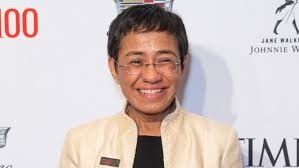Nobel Prize for Philippine journalist Ressa a rebuke to Duterte

The Nobel Peace Prize for Philippine journalist Maria Ressa was hailed by many at home on Saturday as a rebuke on official attacks on the media, but there was no comment from President Rodrigo Duterte, a frequent critic of Ressa’s news site, report Reuters and AFP.
Online desk: Ressa, who is free on bail as she appeals a six-year prison sentence last year for a libel conviction and has faced several other court cases, shared the prize with Russian investigative journalist Dmitry Muratov.
She said on Saturday that her Nobel Peace Prize was for “all journalists around the world”, as she vowed to continue her battle for press freedom.
Duterte has described the Rappler news site that Ressa co-founded as a “fake news outlet” and a tool of the US Central Intelligence Agency.
Rappler, launched in 2012, has challenged Duterte’s policies and the accuracy of his statements. Its investigations have included coverage of the spate of killings by law enforcement during the war on drugs that Duterte launched when he took office in June 2016.
Rights group says authorities summarily executed thousands of drugs suspects. The police deny this, saying those killed violently resisted arrest in sting operations.
Lawmakers and media experts said the award highlights the importance of free speech and speaking truth to power ahead of next year’s elections to choose Duterte’s successor.
Carlos Isagani Zarate, an opposition lawmaker, said the government is in an awkward position.
“The deafening silence from the palace speaks volumes on how they treated Maria Ressa in the past and how they were taken aback by this recognition,” Zarate told Reuters. “This is a personal rebuke on Duterte who was insulting critics, especially women.”
Ressa is the first Filipino to individually win a Nobel — 13 Filipinos were in organisations that received the prizes in 2017, 2013 and 2007.
“For the (presidential) palace, the dilemma is how to congratulate someone who is a victim of persecution by the government,” Danilo Arao, a journalism professor at the University of the Philippines, told Reuters.
Duterte’s government denies persecuting critics in the media.
The presidential palace, Duterte’s spokesperson, his chief legal counsel, and communications office did not respond to Reuters requests for comment on Ressa’s award or on critics’ reactions.
Justice Secretary Menardo Guevarra welcomed Ressa’s win but said libel laws would be upheld.
“As an ordinary Filipino, I am happy that a fellow Filipino has been included in this year’s roster of Nobel Peace laureates,” Guevarra said in a statement.
He said freedom of expression is constitutionally guaranteed in the Philippines but there are legal limits, including libel and defamation.
“Prosecutorial discretion will always be guided by these legal principles and the facts obtaining in any given case, regardless of the persons involved,” Guevarra said.
In 2018, Duterte banned Rappler from covering his official events, prompting the news site to cover event speeches and activities via live television and social media.
Several well-wishers said the Nobel highlights the importance of the media, truth and democracy ahead of Duterte ending his six-year term in June.
Ressa’s prize highlights the importance of protecting freedom of the press “as our vanguard against abuse of power, and an essential element of democracy,” the Management Association of the Philippines said in a statement.
“This is really for all journalists around the world,” Ressa told AFP in an interview.
“We do need help on so many fronts — it is so much more difficult and dangerous to be a journalist today.”
Ressa, 58, said she hoped the prize would provide a protective shield for her and other journalists in the Philippines against physical attacks and online threats.
“This ‘us against them’ was never the creation of the journalists, it was the creation of the people in power who wanted to use a type of leadership that divides society,” she said, describing the award “like a shot of adrenalin”.
“I hope this allows journalists to do our jobs well without fear.”
Besides Rappler, other media outlets in the Philippines have fallen foul of Duterte, including the Philippine Daily Inquirer and the broadcasting giant ABS-CBN, which lost its free-to-air licence last year.
But Ressa said Rappler’s independence meant it could fight back. “We have no other businesses to protect … so it’s very easy for us to push back,” she said.
Ressa said the seven legal cases, including tax evasion, still before the courts were “ludicrous” and she was determined to win. Two other cyber libel cases were dismissed earlier this year.
“That abuse of power would have worked if I allowed the fear in my emotions and in my head to dominate our reaction — the biggest challenge was always to conquer your fear,” she said.
“Being fearless doesn’t mean not being afraid, it just means knowing how to handle your fear.”











